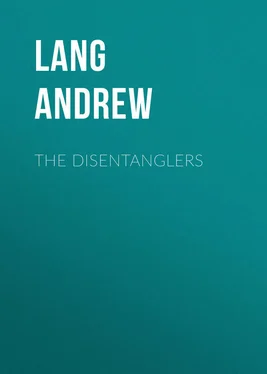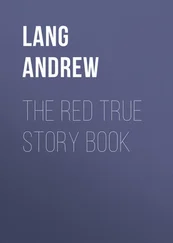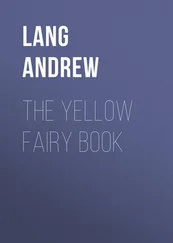Andrew Lang - The Disentanglers
Здесь есть возможность читать онлайн «Andrew Lang - The Disentanglers» — ознакомительный отрывок электронной книги совершенно бесплатно, а после прочтения отрывка купить полную версию. В некоторых случаях можно слушать аудио, скачать через торрент в формате fb2 и присутствует краткое содержание. Жанр: foreign_antique, foreign_prose, на английском языке. Описание произведения, (предисловие) а так же отзывы посетителей доступны на портале библиотеки ЛибКат.
- Название:The Disentanglers
- Автор:
- Жанр:
- Год:неизвестен
- ISBN:нет данных
- Рейтинг книги:5 / 5. Голосов: 1
-
Избранное:Добавить в избранное
- Отзывы:
-
Ваша оценка:
- 100
- 1
- 2
- 3
- 4
- 5
The Disentanglers: краткое содержание, описание и аннотация
Предлагаем к чтению аннотацию, описание, краткое содержание или предисловие (зависит от того, что написал сам автор книги «The Disentanglers»). Если вы не нашли необходимую информацию о книге — напишите в комментариях, мы постараемся отыскать её.
The Disentanglers — читать онлайн ознакомительный отрывок
Ниже представлен текст книги, разбитый по страницам. Система сохранения места последней прочитанной страницы, позволяет с удобством читать онлайн бесплатно книгу «The Disentanglers», без необходимости каждый раз заново искать на чём Вы остановились. Поставьте закладку, и сможете в любой момент перейти на страницу, на которой закончили чтение.
Интервал:
Закладка:
‘We can do nothing with these people,’ Merton remarked. ‘We can’t send down a young and elegant friend of ours to distract the affections of an elderly female agriculturist. The bonny labouring boy would punch the fashionable head; or, at all events, would prove much more attractive to the widow than our agent.
‘Then there are the members of the Hebrew community. They hate mixed marriages, and quite right too. I deeply sympathise. But if Leah has let her affections loose on young Timmins, an Anglo-Saxon and a Christian, what can we do? How stop the mésalliance? We have not, in our little regiment, one fair Hebrew boy to smile away her maiden blame among the Hebrew mothers of Maida Vale, and to cut out Timmins. And of course it is as bad with the men. If young Isaacs wants to marry Miss Julia Timmins, I have no Rebecca to slip at him. The Semitic demand, though large and perhaps lucrative, cannot be met out of a purely Aryan supply.’
Business was pretty slack, and so Merton rather rejoiced over the application of a Mrs. Nicholson, from The Laburnums, Walton-on-Dove, Derbyshire. Mrs. Nicholson’s name was not in Burke’s ‘Landed Gentry,’ and The Laburnums could hardly be estimated as one of the stately homes of England. Still, the lady was granted an interview. She was what the Scots call ‘a buddy;’ that is, she was large, round, attired in black, between two ages, and not easily to be distinguished, by an unobservant eye, from buddies as a class. After greetings, and when enthroned in the client’s chair, Mrs. Nicholson stated her case with simplicity and directness.
‘It is my ward,’ she said, ‘Barbara Monypenny. I must tell you that she was left in my charge till she is twenty-six. I and her lawyers make her an allowance out of her property, which she is to get when she marries with my consent, at whatever age.’
‘May I ask how old the lady is at present?’ said Merton.
‘She is twenty-two.’
‘Your kindness in taking charge of her is not not wholly uncompensated?’
‘No, an allowance is made to me out of the estate.’
‘An allowance which ends on her marriage, if she marries with your consent?’
‘Yes, it ends then. Her uncle trusted me a deal more than he trusted Barbara. She was strange from a child. Fond of the men,’ as if that were an unusual and unbecoming form of philanthropy.
‘I see, and she being an heiress, the testator was anxious to protect her youth and innocence?’
Mrs. Nicholson merely sniffed, but the sniff was affirmative, though sarcastic.
‘Her property, I suppose, is considerable? I do not ask from impertinent curiosity, nor for exact figures. But, as a question of business, may we call the fortune considerable?’
‘Most people do. It runs into six figures.’
Merton, who had no mathematical head, scribbled on a piece of paper. The result of his calculations (which I, not without some fever of the brow, have personally verified) proved that ‘six figures’ might be anything between 100,000 l . and 999,000 l . 19 s . 11¾ d .
‘Certainly it is very considerable,’ Merton said, after a few minutes passed in arithmetical calculation. ‘Am I too curious if I ask what is the source of this opulence?’
‘“Wilton’s Panmedicon, or Heal All,” a patent medicine. He sold the patent and retired.’
Merton shuddered.
‘It would be Pammedicum if it could be anything,’ he thought, ‘but it can’t, linguistically speaking.’
‘Invaluable as a subterfuge,’ said Mrs. Nicholson, obviously with an indistinct recollection of the advertisement and of the properties of the drug.
Merton construed the word as ‘febrifuge,’ silently, and asked: ‘Have you taken the young lady much into society: has she had many opportunities of making a choice? You are dissatisfied with the choice, I understand, which she has made?’
‘I don’t let her see anybody if I can help it. Fire and powder are better kept apart, and she is powder, a minx! Only a fisher or two comes to the Perch, that’s the inn at Walton-on-Dove, and they are mostly old gentlemen, pottering with their rods and things. If a young man comes to the inn, I take care to trapes after her through the nasty damp meadows.’
‘Is the young lady an angler?’
‘She is – most unwomanly I call it.’
Merton’s idea of the young lady rose many degrees. ‘You said the young lady was “strange from a child, very strange. Fond of the men.” Happily for our sex, and for the world, it is not so very strange or unusual to take pity on us.’
‘She has always been queer.’
‘You do not hint at any cerebral disequilibrium?’ asked Merton.
‘Would you mind saying that again?’ asked Mrs. Nicholson.
‘I meant nothing wrong here ?’ Merton said, laying his finger on his brow.
‘No, not so bad as that,’ said Mrs. Nicholson; ‘but just queer. Uncommon. Tells odd stories about – nonsense. She is wearing with her dreams. She reads books on, I don’t know how to call it – Tipsy-cake, Tipsicakical Search. Histories, I call it.’
‘Yes, I understand,’ said Merton; ‘Psychical Research.’
‘That’s it, and Hyptonism,’ said Mrs. Nicholson, as many ladies do.
‘Ah, Hyptonism, so called from its founder, Hypton, the eminent Anglo-French chemist; he was burned at Rome, one of the latest victims of the Inquisition,’ said Merton.
‘I don’t hold with Popery, sir, but it served him right.’
‘That is all the queerness then!’
‘That and general discontentedness.’
‘Girls will be girls,’ said Merton; ‘she wants society.’
‘Want must be her master then,’ said Mrs. Nicholson stolidly.
‘But about the man of her choice, have you anything against him?’
‘No, but nothing for him: I never even saw him.’
‘Then where did Miss Monypenny make his acquaintance?’
‘Well, like a fool, I let her go to pass Christmas with some distant cousins of my own, who should have known better. They stupidly took her to a dance, at Tutbury, and there she met him: just that once.’
‘And they became engaged on so short an acquaintance?’
‘Not exactly that. She was not engaged when she came home, and did not seem to mean to be. She did talk of him a lot. He had got round her finely: told her that he was going out to the war, and that they were sister spirits. He had dreamed of meeting her, he said, and that was why he came to the ball, for he did not dance. He said he believed they had met in a state of pre – something; meaning, if you understand me, before they were born, which could not be the case: she not being a twin, still less his twin.’
‘That would be the only way of accounting for it, certainly,’ said Merton. ‘But what followed? Did they correspond?’
‘He wrote to her, but she showed me the letter, and put it in the fire unopened. He had written his name, Marmaduke Ingles, on a corner of the envelope.’
‘So far her conduct seems correct, even austere,’ said Merton.
‘It was at first, but then he wrote from South Africa, where he volunteered as a doctor. He was a doctor at Tutbury.’
‘She opened that letter?’
‘Yes, and showed it to me. He kept on with his nonsense, asking her never to forget him, and sending his photograph in cocky.’
‘Pardon!’ said Merton.
‘In uniform. And if he fell, she would see his ghost, in cocky, crossing her room, he said. In fact he knew how to get round the foolish girl. I believe he went out there just to make himself interesting.’
‘Did you try to find out what sort of character he had at home?’
‘Yes, there was no harm in it, only he had no business to speak of, everybody goes to Dr. Younghusband.’
Читать дальшеИнтервал:
Закладка:
Похожие книги на «The Disentanglers»
Представляем Вашему вниманию похожие книги на «The Disentanglers» списком для выбора. Мы отобрали схожую по названию и смыслу литературу в надежде предоставить читателям больше вариантов отыскать новые, интересные, ещё непрочитанные произведения.
Обсуждение, отзывы о книге «The Disentanglers» и просто собственные мнения читателей. Оставьте ваши комментарии, напишите, что Вы думаете о произведении, его смысле или главных героях. Укажите что конкретно понравилось, а что нет, и почему Вы так считаете.












